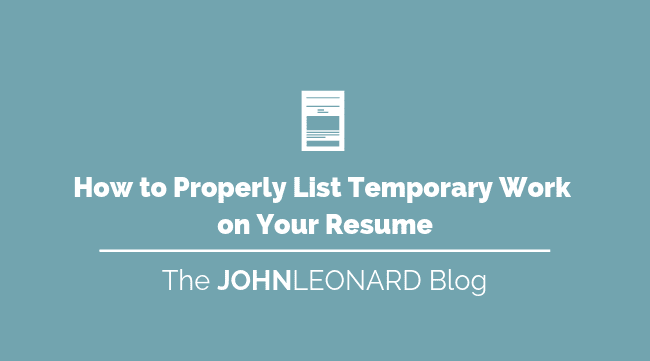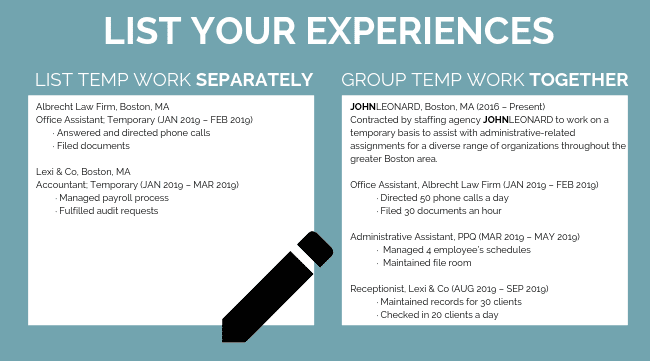
Referencing temporary work on your resume can make the difference between impressing hiring managers or turning them away. Listing your contract work on your resume should highlight your skills, experience, and flexibility as a candidate. Despite the short-term nature of temp positions, it’s important to give them the same level of attention as full-time roles. Don’t underestimate the value of your work, but rather, accurately list and explain it. Follow the tips below to effectively showcase the worth of your temp experiences to potential employers
List Experience Appropriately
Working different temp jobs means you will need to frequently update your resume because your employment is consistently changing. It is crucial that you properly list your temp jobs, whether it’s a couple of positions or multiple. First, write down all your jobs and decide if it’s beneficial to list each assignment separately or to group them together.
If you’ve only had a few short-term positions, consider listing these separately. Just like a full-time position, include the organization’s name, city and state, job title, start, and end date, and your responsibilities and achievements. The key is to label each of your experiences as temp, temporary, or contract alongside the job title. Make sure to choose just one word and keep it consistent throughout your resume.
Example
Albrecht Law Firm, Boston, MA
Office Assistant; Temporary (JAN 2019 – FEB 2019)
- Answered and directed phone calls
- Filed documents
Lexi & Co, Boston, MA
Accountant; Temporary (JAN 2019 – MAR 2019)
- Managed payroll process
- Fulfilled audit requests
If you have multiple temp jobs, group them together. This works especially well if you have several similar assignments under one agency. Add the staffing agency as your employer and the start and end dates of your employment with the agency. Remember, the staffing agency is your employer, they are the ones sending you on a work placement, not the organization. Right below the agency’s name, include a short blurb that connects all your relevant temp work together. Next, reference the job title, the organization’s name, dates of employment, and main duties completed for each placement.
Example
JOHNLEONARD, Boston, MA (2016 – Present)
Contracted by staffing agency JOHNLEONARD to work on a temporary basis to assist with administrative-related assignments for a diverse range of organizations throughout the greater Boston area.
Office Assistant, Albrecht Law Firm (JAN 2019 – FEB 2019)
- Directed 50 phone calls a day
- Filed 30 documents an hour
Administrative Assistant, PPQ (MAR 2019 – MAY 2019)
- Managed 4 employee’s schedules
- Maintained file room
Receptionist, Lexi & Co (AUG 2019 – SEP 2019)
- Maintained records for 30 clients
- Checked in 20 clients a day
Depending on your unique employment history, there are multiple ways you can accurately group your temp work. Sort through your experience and place your positions where you best see fit. While formatting your temp jobs, keep in mind standard resume etiquette and different ways to make your resume stand out among your competition.
Make the most out of your temp background
A valuable tip is not to lie or fail to mention your temp work on your resume. If you’re worried about listing temp work because you look like a job hopper, forget that preconceived idea. Especially in today’s job market, job hopping is less frowned upon because of the increased popularity of temporary/freelance work. Your temp experiences should be considered an asset of your career, not a red flag. Be confident in the work you have completed and accurately show the value you gained from each one of your assignments.

When showcasing your temporary work experience on your resume, it’s essential to maintain a clear and concise format. With these helpful tips, you can present your temp work as an asset rather than an obstacle. Highlighting your determination, willingness to take on new challenges, and proactive job-seeking approach is precisely what hiring managers seek in potential candidates.
Looking for more ways to improve your job search? Subscribe to the JOHNLEONARD blog today and receive helpful advice directly from our team!
